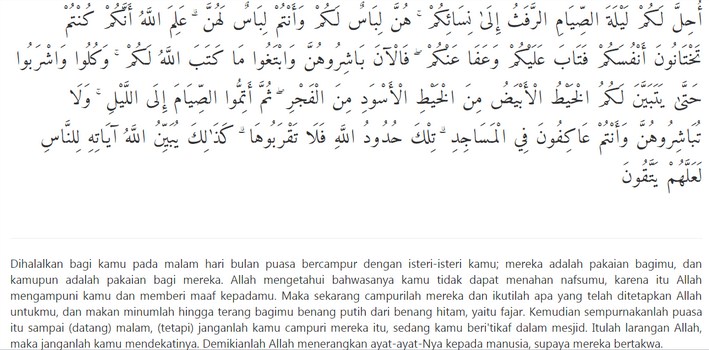Pillars of Fasting
Pillars of Fasting – Based on the consensus of scholars, The pillars of fasting are refraining from various breakers of fasting, namely starting from dawn (dawn shodiq) until sunset.

Pillars of Fasting
This is based on the word of Allah SWT Surah Al Baqoroh verse 187

From 'Adi bin Hatim when the letter Al Baqarah verse was revealed 187,
Prophet Muhammad SAW said to him,
إِنَّمَا ذَاكَ بَيَاضُ النَّهَارِ مِنْ سَوَادِ اللَّيْلِ
"What is meant is the brightness of the day from the darkness of the night". The Prophet SAW said like that to 'Adi bin Hatim because before he took two black and white threads. Then waiting for the appearance of the white thread from the black thread, but it doesn't appear. Then he told this to Rasulullah SAW, then he laughed at the behavior of 'Adi bin Hatim'
Read it too : Ramadan fasting
Obligatory Fasting Conditions
The obligatory conditions for fasting are the characteristics of someone who is obliged to fast in the month of Ramadan. The conditions for fasting are obligatory, namely::
- islam
- sensible
- has reached puberty
- knowing the obligation of fasting.
Obligatory Conditions of Fasting
Mandatory condition of fasting, it means when you find a certain time, then fasting is obligatory. The conditions in question are as follows:.
1 . Healthy (painless)
2 . settled, not on the go .
The proof of the second condition is the word of Allah SWT in Surat Al Baqoroh verse 185

These two conditions include the obligatory condition of fasting and not the valid condition of fasting and not the obligatory condition of qodho’ fasting. Because the obligatory condition of fasting here falls on people who are sick and people who are traveling or traveling a long way.
When they don't fast at that time, then perform qodho’ based on the agreement of the scholars. But apabla they still fast in such a situation, his fast remains valid.
3 . Holy from menstruation and childbirth.
The proof is the hadith from Mu'adzah, he once asked 'Aishah radhiyallahu 'anha.
The hadith is
![]() .
.
From Mu'adzah he said:
"I asked Aisyah while saying, 'Why do women who are menstruating have sex?’ fasting and not fasting’ Salat?’ So Aisyah answered, 'Are you from the Haruriyah group??
I answer,
'I'm not Haruriyah, but I'm just asking.’ He answered, 'We used to have periods too, then we were ordered to perform the qadha’ fasting and not being ordered to make qadah’ Salat'.”
Based on the consensus of scholars, women who are in menstruation and postpartum are not required to fast and are required to perform qodho’ fasting
Read it too : About Women's Blood
Valid Conditions of Fasting
The legal condition of fasting is there 2 , which is as summarized below
The first
Must be in a state of purity from menstruation and childbirth. This condition is a condition for the obligation of fasting and also a condition for the validity of fasting.
The second
Intend. Intention is a valid condition for fasting because fasting is worship while worship is not valid except with intentions like other worship.
Evidence of this is the words of the Prophet Muhammad SAW
إِنَّمَا الأَعْمَالُ بِالنِّيَّاتِ
"Indeed charity depends on the intention.”
The intention of fasting must be done to distinguish it from other hunger pangs. Holding back hunger can be just a habit, or in order to diet, or also because of illness to the point that it must be distinguished from fasting which is worship.
However, Readers need to know that intentions are not spoken (pronounced). Because what is meant by intention is the will to do something and the intention is in the heart. May Allah have mercy on An Nawawi –a great scholar in Shafi'iyah- which says,
![]()
"It is not valid for someone to fast except with intention. Put the intention that is in the heart, not required to be spoken. There is no dispute on this issue among the scholars.”
But some are reciting or saying intentions, it is to strengthen the heart so that it is not negligent that the next day we will fast
Ibn Taymiyya said:,
![]()
"The intention is in the heart based on the agreement of the scholars". If someone has an intention in his heart without saying it with his mouth, then his intention is considered valid based on the agreement of the scholars.”
The post Rukun Puasa appeared first on this page.